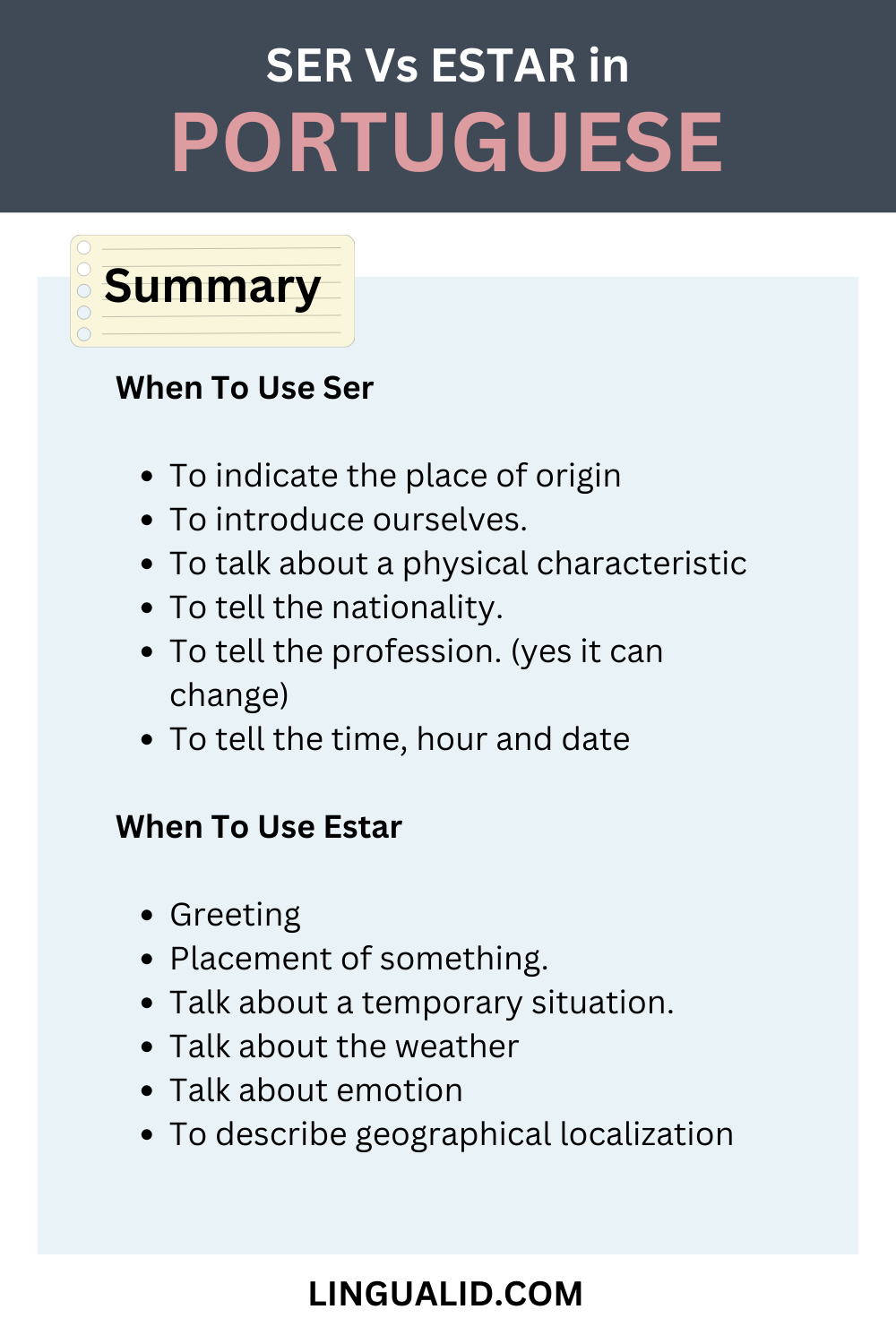In this lesson, we will talk about Ser and Estar in Portuguese, their conjugations and when to use each one of them.

Ser vs Estar in Portuguese
We have two different verbs to express the English verb “to be” in Portuguese: Ser and Estar, each one has its own usage, before talking about it, let’s get their conjugation right first (present):
| Pronoun | Ser | Estar |
| Eu | Sou | Estou |
| Você | É | Está |
| Ele/ela | É | Está |
| A gente | É | Está |
| Nós | Somos | Estamos |
| Vocês | São | Estão |
| Eles/elas | São | Estão |
In general, the verb “Ser” is used for permanent (or long lasting) situations, while the verb “Estar” is used for more shorter situations.
I said in general because there are some exceptions that we will talk about later in this post.
My nationality for example is a permanent situation, so I would say “eu sou marroquino” (I’m Moroccan), being in my room, in the opposite, is a temporary situation, so I’d say “estou no meu quarto” (I’m in my room)
Good, now if you’d describe two people being short, an adult and a little kid, would you use the same verb? look:
This man is short – esse homem é baixo (probably permanent lol)
This kid is short – esse garoto esta baixo (he will grow up)
What about describing a girl being pretty, is it because of makeup and clothes or she’s been always pretty?
Beauty is that kind of situation that can’t change overnight, normally we say “ela é bonita”, saying “ela esta bonita” will make us understand that she’s not always pretty.
Note: you can practice what you’ve learned here, and learn how to pronounce each of the words in our Memrise course here, don’t know how to use the platform or sign up? we’ve got you covered in this easy-to-follow tutorial here.
When to use “ser” and “estar”
We use the verb “ser”:
- To indicate the place of origin
- To introduce ourselves.
- To talk about a physical characteristic
- To tell the nationality.
- To tell the profession. (yes it can change)
- To tell the time.
We use the verb “estar”:
- Greeting (como está?/how are you?)
- Placement of something.
- Talk about a temporary situation.
- Talk about the weather
- Talk about emotion
- To describe geographical localization

Mastering SER and ESTAR in Portuguese
Quiz
Instructions: Answer the following questions in 2-3 sentences, providing examples where applicable.
- What is the main difference between “ser” and “estar” in Portuguese?
- Provide an example sentence in Portuguese using “ser” to describe a permanent characteristic.
- Provide an example sentence in Portuguese using “estar” to describe a temporary state.
- How would you ask someone “How are you?” in Portuguese using “estar”?
- Which verb, “ser” or “estar,” would you use to describe the weather? Provide an example sentence.
- If you wanted to tell someone your profession in Portuguese, which verb would you use? Why?
- Explain the difference in meaning between “Ela é bonita” and “Ela está bonita.”
- Which verb would you use to describe someone’s geographical location?
- When describing someone’s height, how would the choice of “ser” or “estar” change the meaning?
- Provide an example of how the concept of time influences the choice between “ser” and “estar.”
Quiz Answer Key
- “Ser” is used for permanent or long-lasting states and characteristics, while “estar” is used for temporary situations and conditions.
- “Ele é alto.” (He is tall.) This describes a permanent physical characteristic.
- “Estou cansada.” (I am tired.) Tiredness is a temporary state.
- “Como está?” (Formal) or “Como estás?” (Informal)
- “Está” is used to talk about the weather. Example: “Hoje está frio.” (It’s cold today.)
- “Ser” is used to describe one’s profession, even if it might change. Example: “Sou professor.” (I am a teacher.)
- “Ela é bonita” means “She is beautiful,” suggesting a lasting quality. “Ela está bonita” means “She looks beautiful,” implying a temporary state perhaps due to clothing or makeup.
- “Estar” is used to describe geographical location. Example: “O restaurante está perto daqui.” (The restaurant is near here.)
- “Ser baixo” implies someone is short as a permanent characteristic, while “estar baixo” suggests they appear short perhaps due to slouching or being surrounded by taller people.
- “São dez horas.” (It’s ten o’clock.) Time is constant in this context, so “ser” is used. However, “estou atrasado” (I am late) uses “estar” because being late is a temporary situation.
Happy learning!
Oualid Cheddadi is the founder of Lingualid, a platform that inspires independent language learners worldwide, regardless of the language they are learning. The name “Lingualid” is derived from the Portuguese word for “language,” “língua,” and the last three letters of Oualid’s name, “Lid.”



